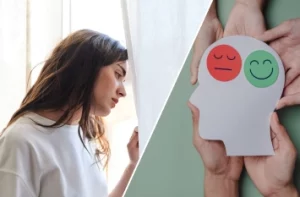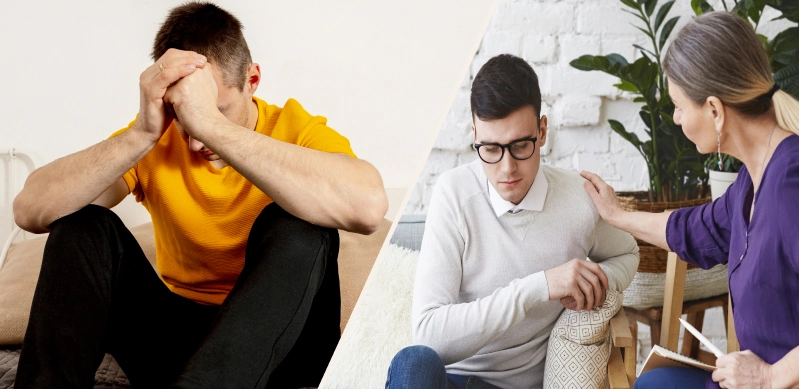
Depression vs Bipolar: Understanding Differences
Depression vs Bipolar: Understanding the Differences Depression and bipolar disorder are two commonly

Crippling anxiety is more than just feeling nervous or stressed from time to time; it’s an overwhelming and often debilitating mental health condition that can significantly impact daily life. While everyone experiences anxiety to some degree, those with crippling anxiety may find it challenging to function normally. Coping with crippling anxiety is not easy, but it is possible with the right strategies and support.
In this article, we’ll explore what crippling anxiety is, its symptoms, and effective coping mechanisms to help you manage this condition and improve your quality of life.
Crippling anxiety, also known as severe anxiety or high-functioning anxiety, is a mental health condition characterized by intense and persistent feelings of fear, worry, and nervousness. Unlike normal feelings of anxiety that may arise in response to specific stressors, crippling anxiety can be overwhelming and may occur without any apparent trigger.
Individuals with crippling anxiety often experience physical symptoms such as rapid heartbeat, sweating, trembling, and shortness of breath, which can further exacerbate their distress. This type of anxiety can interfere with daily activities, work, and relationships, making it difficult for individuals to lead a fulfilling life.
Crippling anxiety can manifest in various forms, including panic attacks, obsessive-compulsive behaviors, social anxiety, and specific phobias. It can also co-occur with other mental health disorders, such as depression, making it essential to seek professional help for proper diagnosis and treatment.
Crippling anxiety can stem from a combination of genetic, environmental, and psychological factors. While the exact cause may vary from person to person, some common factors that contribute to crippling anxiety include:
Genetics:
Brain Chemistry:
Trauma:
Stressful Life Events:
Personality:
Crippling anxiety can manifest in various physical, emotional, and behavioral symptoms that can significantly impact an individual’s daily life. Here are some common symptoms associated with crippling anxiety:
Physical Symptoms:
Emotional and Behavioral Symptoms:
Dealing with crippling anxiety as a teenager can be especially challenging due to the many changes and pressures associated with adolescence. However, there are several strategies that can help teenagers cope with their anxiety and improve their overall well-being.
First and foremost, it’s essential for teenagers to recognize and acknowledge their anxiety rather than trying to ignore or suppress it. Open communication with trusted friends, family members, or a mental health professional can provide much-needed support and guidance.
Additionally, practicing relaxation techniques such as deep breathing, mindfulness, and meditation can help teenagers manage their anxiety symptoms effectively. Regular exercise, a healthy diet, and sufficient sleep are also crucial for maintaining physical and mental health.
Lastly, teenagers should try to identify and challenge negative thought patterns and replace them with more positive and realistic ones. Learning to prioritize self-care and seeking professional help when needed are essential steps in managing crippling anxiety during the teenage years.
Coping with crippling anxiety requires a combination of self-care strategies, professional support, and lifestyle changes. Here are ten effective coping mechanisms to help you manage your anxiety and improve your overall well-being:
Deep breathing exercises, progressive muscle relaxation, and mindfulness meditation are powerful tools for calming the mind and body during times of anxiety. These techniques help reduce muscle tension, slow down your heart rate, and promote a sense of relaxation.
Regular exercise is essential for managing anxiety. Physical activity releases endorphins, which are natural stress-relievers and help regulate mood. Aim for at least 30 minutes of moderate exercise most days of the week. Activities like walking, jogging, swimming, or yoga can be particularly beneficial.
Make time for activities that help you relax and recharge. Engage in hobbies you enjoy, spend time with loved ones, or simply take a break to read a book or listen to music. Practicing self-care regularly can help reduce stress and improve your overall well-being.
A balanced diet, adequate sleep, and limiting caffeine and alcohol intake are essential for managing anxiety. Avoiding stimulants like caffeine and ensuring you get enough sleep can help regulate your mood and energy levels, while a nutritious diet provides the fuel your body and brain need to function optimally.
Identify situations, people, or environments that trigger your anxiety, and try to minimize exposure to them whenever possible. Whether it’s certain social situations, news stories, or even specific places, recognizing and avoiding triggers can help reduce anxiety levels.
Practice cognitive-behavioral techniques to challenge negative thought patterns. Keep a journal to track your thoughts and identify patterns of negative thinking. Then, work on replacing these thoughts with more positive and realistic ones. This can help you develop a more balanced perspective and reduce feelings of anxiety.
Surround yourself with supportive friends, family members, or a therapist who can offer encouragement, understanding, and guidance. Talking to someone you trust about your feelings can provide relief and help you feel less alone in your struggles.
Break tasks down into smaller, more manageable steps, and set realistic goals for yourself. Celebrate your achievements, no matter how small, and don’t be too hard on yourself if things don’t go as planned. Setting achievable goals can help build confidence and reduce feelings of overwhelm.
Take advantage of relaxation apps, guided imagery, or meditation exercises that can help calm your mind and reduce anxiety. There are many resources available online that offer guided relaxation techniques, deep breathing exercises, and mindfulness practices that you can use whenever you need them.
If your anxiety is significantly impacting your daily life and functioning, don’t hesitate to seek professional help from a therapist or counselor. Therapy can provide you with additional support, coping strategies, and guidance for managing your anxiety. A mental health professional can work with you to develop an individualized treatment plan that meets your needs and helps you live a happier, healthier life.
While anxiety is a common emotion experienced by everyone at some point in their lives, crippling anxiety, also known as severe anxiety or high-functioning anxiety, is a more intense and debilitating form of anxiety that can significantly impact daily functioning. Here are some key differences between anxiety and crippling anxiety:
Anxiety | Crippling Anxiety |
Occasional feelings of nervousness or worry | Intense and persistent feelings of fear and worry |
Typically manageable and temporary | Overwhelming and persistent, often interfering with daily life |
May arise in response to specific stressors | Can occur without any apparent trigger |
Mild physical symptoms (e.g., butterflies in the stomach) | Severe physical symptoms (e.g., rapid heartbeat, shortness of breath) |
Generally does not interfere with daily activities | Often interferes with work, relationships, and daily tasks |
While everyone experiences anxiety differently, those with crippling anxiety may find it challenging to function normally and may require professional help and support to manage their symptoms effectively.
Crippling health anxiety, also known as hypochondria or illness anxiety disorder, is a mental health condition characterized by an excessive and irrational fear of having a serious medical condition. Individuals with health anxiety often misinterpret normal bodily sensations as signs of serious illness, leading to persistent worry and distress.
This anxiety can become so overwhelming that it interferes with daily life, causing individuals to constantly seek reassurance from doctors, perform frequent self-checks, or avoid situations that trigger their anxiety. Despite medical reassurance, those with crippling health anxiety may remain convinced that they are seriously ill, leading to significant emotional distress and impairment in functioning.
Crippling anxiety can have a profound impact on a person’s life, making everyday tasks and activities seem daunting and overwhelming. However, with the right support and treatment, it is possible to manage and overcome crippling anxiety. If you or someone you know is struggling with crippling anxiety, it’s essential to seek help from a qualified mental health professional.
PB Psychiatric Services offers comprehensive treatment options for anxiety disorders, including therapy, medication management, and support groups, to help individuals regain control of their lives and find relief from their symptoms. Don’t suffer in silence—reach out for help today.

Depression vs Bipolar: Understanding the Differences Depression and bipolar disorder are two commonly

What is Behavioral Health? Behavioral health refers to the connection between behaviors and mental health, where behaviors are seen as a reflection of one’s emotional

Understanding How Bipolar Thinking Affects Relationships: Insights and Strategies for Support Get Instant Relief Now! Borderline Personality Disorder (BPD) is a complex mental health condition
